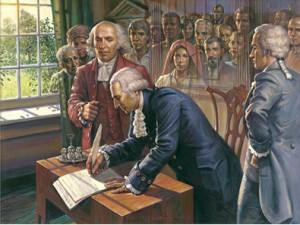Obama War Powers Treachery and The Founders’ Remedies
 As most know by now, Charlie Savage at the New York Times let loose a stunning blockbuster of an expose of the conduct of Barack Obama and his inner circle in relation to the Libyan war vis a vis the War Powers Resolution:
As most know by now, Charlie Savage at the New York Times let loose a stunning blockbuster of an expose of the conduct of Barack Obama and his inner circle in relation to the Libyan war vis a vis the War Powers Resolution:
President Obama rejected the views of top lawyers at the Pentagon and the Justice Department when he decided that he had the legal authority to continue American military participation in the air war in Libya without Congressional authorization, according to officials familiar with internal administration deliberations.
Jeh C. Johnson, the Pentagon general counsel, and Caroline D. Krass, the acting head of the Justice Department’s Office of Legal Counsel, had told the White House that they believed that the United States military’s activities in the NATO-led air war amounted to “hostilities.” Under the War Powers Resolution, that would have required Mr. Obama to terminate or scale back the mission after May 20.
But Mr. Obama decided instead to adopt the legal analysis of several other senior members of his legal team — including the White House counsel, Robert Bauer, and the State Department legal adviser, Harold H. Koh — who argued that the United States military’s activities fell short of “hostilities.” Under that view, Mr. Obama needed no permission from Congress to continue the mission unchanged.
Let’s be crystal clear as to what happened here: The Attorney General, Head of the Office of Legal Counsel and the General Counsel for the Pentagon/DOD all listened to Obama’s plan to flat out ignore the War Powers Resolution (50 U.S.C. 1541-1548), and the Article I power it represents, and they unanimously said it was untenable and illegal in the face of the War Powers Resolution.
Mr. Obama knows the War Powers Resolution exists, does not challenge its viability or Constitutionality and, against the direct opinion and advice of the three most germane attorneys in the United States Government, has just blithely and unilaterally blown it off. There are nine fairly short provisions in the statutory delineation of the “War Power Resolution” and, despite the yammering from the Administration and dithering by the press, they are actually remarkably clear in their intent and letter.
A criminal can nuance, excuse and rationalize himself around pretty much every statutory criminal provision, but society as a whole has no problem looking at the statute and seeing that there is offending conduct. And so it is here; Obama has thrown up sophistry, excuse and self indulgent rationalization. But any honest review of the WPR yields the unmistakable conclusion Obama is in direct violation, and has been from the outset. Congress has been crystal clear that they have NOT authorized Read more →
